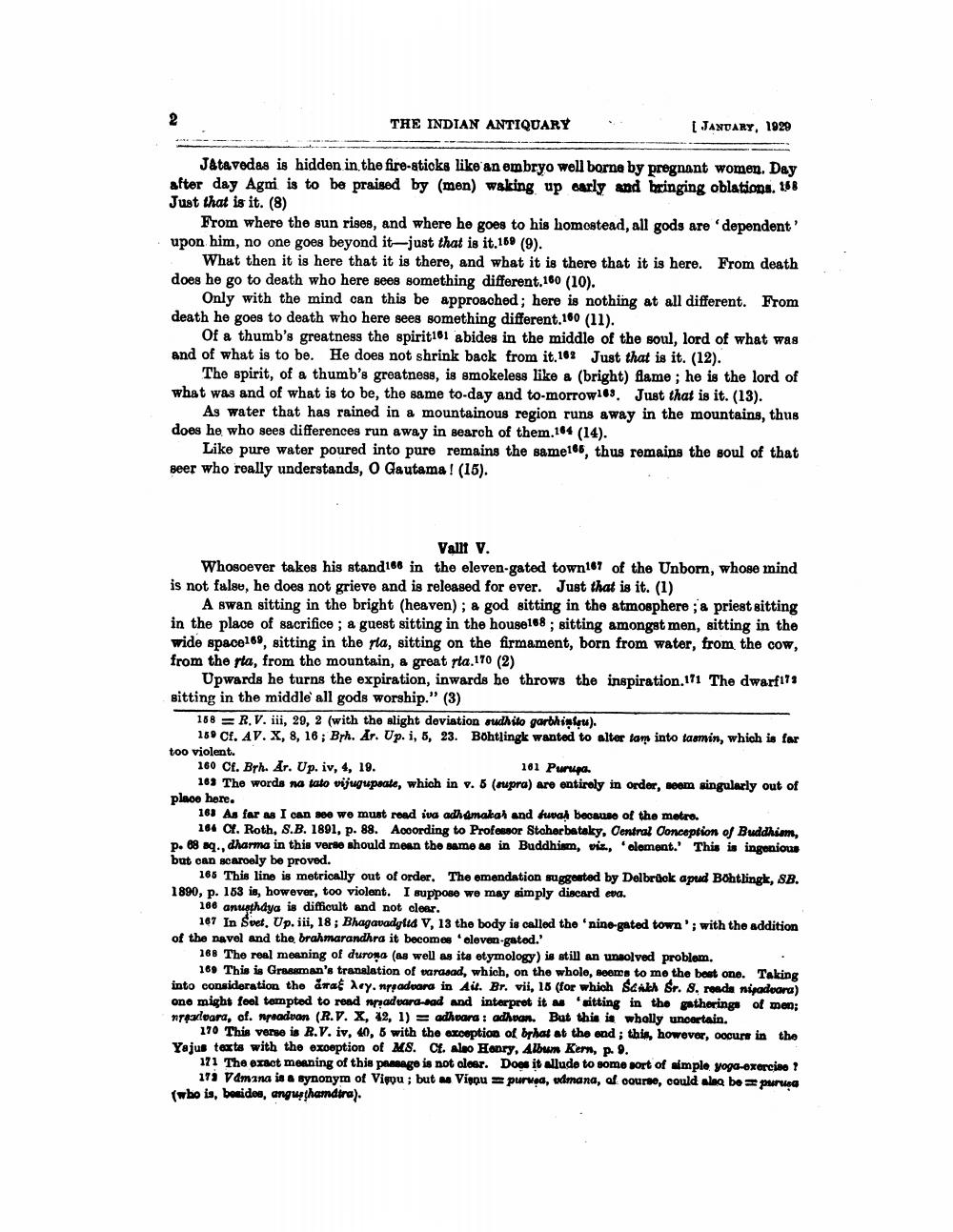________________
THE INDIAN ANTIQUARY
[ JANUARY, 1929
Jatavedas is hidden in the fire-sticks like an embryo well borne by pregnant women. Day after day Agni is to be praised by (men) waking up early and bringing oblations. 168 Just that is it. (8)
From where the sun rises, and where he goes to his homestead, all gods are 'dependent' upon him, no one goes beyond it-just that is it.159 (9).
What then it is here that it is there, and what it is there that it is here. From death does he go to death who here sees something different.160 (10).
Only with the mind can this be approached; here is nothing at all different. From death he goes to death who here sees something different.160 (11).
Of a thumb's greatness the spirit161 abides in the middle of the soul, lord of what was and of what is to be. He does not shrink back from it.162 Just that is it. (12).
The spirit, of a thumb's greatness, is smokeless like a (bright) flame; he is the lord of what was and of what is to be, the same to-day and to-morrow1es. Just that is it. (13).
As water that has rained in a mountainous region runs away in the mountains, thus does he who sees differences run away in search of them.164 (14).
Like pure water poured into pure remains the same166, thus remains the soul of that seer who really understands, O Gautama! (15).
Valli V.
Whosoever takes his stand168 in the eleven-gated town167 of the Unborn, whose mind is not false, he does not grieve and is released for ever. Just that is it. (1)
A swan sitting in the bright (heaven); a god sitting in the atmosphere; a priest sitting in the place of sacrifice; a guest sitting in the house168; sitting amongst men, sitting in the wide space169, sitting in the rla, sitting on the firmament, born from water, from the cow, from the rta, from the mountain, a great rta.170 (2)
Upwards he turns the expiration, inwards he throws the inspiration.171 The dwarfis sitting in the middle all gods worship." (3)
168 R. V. iii, 29, 2 (with the slight deviation sudhito garbhinten).
159 Cf. AV. X, 8, 16; Brh. Ar. Up. i, 5, 23. Böhtlingk wanted to alter tam into tasmin, which is far
too violent.
160 Cf. Brh. Ar. Up. iv, 4, 19.
101 Puruga.
163 The words na tato vijugupsate, which in v. 5 (supra) are entirely in order, seem singularly out of place here.
163 As far as I can see we must read iva adhamakah and duvaḥ because of the metre.
164 Cf. Roth, S.B. 1891, p. 88. According to Professor Stoherbatsky, Central Conception of Buddhism, p. 88 sq., dharma in this verse should mean the same as in Buddhism, viz., element.' This is ingenious but can scarcely be proved.
165 This line is metrically out of order. The emendation suggested by Delbrück apud Böhtlingk, SB. 1890, p. 153 is, however, too violent. I suppose we may simply discard eva.
166 anusthaya is difficult and not clear.
167 In Svet, Up. iii, 18; Bhagavadgltd V, 13 the body is called the 'nine-gated town'; with the addition of the navel and the brahmarandhra it becomes 'eleven-gated.'
168 The real meaning of durona (as well as its etymology) is still an unsolved problem.
169 This is Grassman's translation of varasad, which, on the whole, seems to me the best one. Taking into consideration the arat Aey. nreadvara in Ait. Br. vii, 15 (for which Sakh Sr. S. reada nisadvara) one might feel tempted to read nad vara-sad and interpret it as sitting in the gatherings of men; nrealvara, of. nreadvan (R.V. X, 42, 1) = adhvara: adhvan. But this is wholly uncertain.
170 This verse is R. V. iv, 40, 5 with the exception of brhat at the end; this, however, occurs in the Yajus texts with the exception of MS. Ct. also Henry, Album Kern, p. 9.
171 The exact meaning of this passage is not clear. 173 Vamana is a synonym of Vispu; but as Visņu (who is, besides, angusthamdira).
Does it allude to some sort of simple yoga-exercise? purwea, vdmana, of course, could also be purusa




